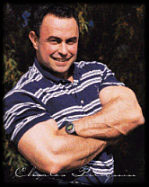Zach Marcy: How did you first get into training some of the worlds elite athletes? Were you destined to do this or did it happen across your path and you jumped on it?
Charles Poliquin: It started with a National Team Volleyball player who saw me training in the weight room at the university and asked for my help. Under my guidance, he tested a few months as the most powerful player on the team, which lead me to train one of his colleagues, who brought me another one. The rest is history.
 Zach Marcy: You're not one of the pencil necked trainers that you see in the gym. You have some SERIOUS guns and appear to practice what you preach. I'm currently on Phase 3 of your arm program laid out in Winning The Arms Race and I love the intensity and set layout of the program. Can you explain some of the principles of this program and some of the results you've seen from it?
Zach Marcy: You're not one of the pencil necked trainers that you see in the gym. You have some SERIOUS guns and appear to practice what you preach. I'm currently on Phase 3 of your arm program laid out in Winning The Arms Race and I love the intensity and set layout of the program. Can you explain some of the principles of this program and some of the results you've seen from it?
Charles Poliquin: Basically Winning The Arms Race is a compilation of the best arm routines I know. It should give you 6 months of continuous growth.
Zach Marcy: One of the philosophies that you teach, and I've successfully adapted in my own trainings, is that of constant, dynamic change in your programs. You've said there is no ONE program that will work forever, but continuous change in your programs keeps people making constant gains. Can you expound on this?
Charles Poliquin: Getting stronger or bigger is like learning a foreign language. If you don't challenge your "learning", you will never grow.
Zach Marcy: Another philosophy I've heard you talk about is interspersing strength cycles in with hypertrophy cycles of weight lifting. In other words there are times someone interested in bodybuilding should stray from doing exercises for muscle size only and should focus more on strength. What are the theories behind this and why would it benefit a bodybuilder to train in this manner?
Charles Poliquin: A bodybuilder aims at hypertrophying the cross-section of their muscles. Strength training allows them to recruit new motor units that they can hypertrophy with their regular training.
Zach Marcy: You say there is no perfect training system, but people should rotate through various training methods in order to be in a state of constant growth. Say I'm a bodybuilder looking to place together 3 or 4 programs that I can rotate through in order to get my best results of hypertrophy. In your opinion, what 3 or 4 best workout programs could I do the rest of my life in order to stay in a constant growth state?
Charles Poliquin: It would not work optimally. Sixteen different good programs would give you more gains than 4 good programs rotated in and out.
Zach Marcy: In recent days I've been involved in numerous debates on a lot of your methods vs. the methods of HIT promoted by the late Mike Mentzer. What arguments can you make for your basic methods versus some of the other philosophies in HIT?
Charles Poliquin: Dorian Yates has been and is still under the care of my clinic as often as we can meet. We have had the chance to exchange concepts in training. One cannot argue with his results, but he realizes that varying the exercises more would have given him a healthier longer career. But exercise tolerance is a very unique thing as discussed in the book I co-authored with Will Brink Muscle Building Nutrition (it is available on Charles's web site) HIT does work, but I don't think it is for every body. For example, Brian Haycock system also works. I trained that way in University and made zero progress. I am blessed with a high percentage of fast-twit